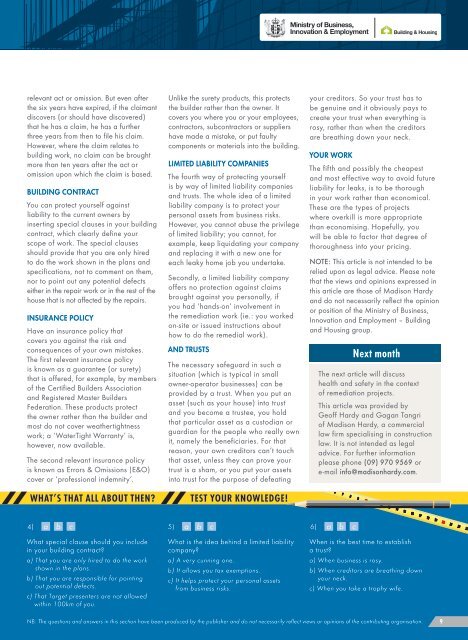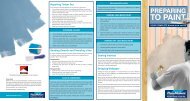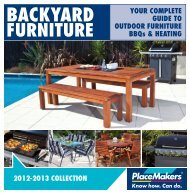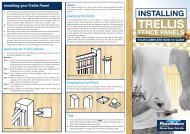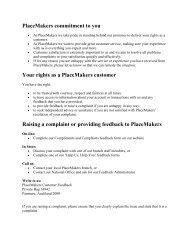what we learned from christchurch taking the risk out ... - PlaceMakers
what we learned from christchurch taking the risk out ... - PlaceMakers
what we learned from christchurch taking the risk out ... - PlaceMakers
Create successful ePaper yourself
Turn your PDF publications into a flip-book with our unique Google optimized e-Paper software.
elevant act or omission. But even after<strong>the</strong> six years have expired, if <strong>the</strong> claimantdiscovers (or should have discovered)that he has a claim, he has a fur<strong>the</strong>rthree years <strong>from</strong> <strong>the</strong>n to file his claim.Ho<strong>we</strong>ver, where <strong>the</strong> claim relates tobuilding work, no claim can be broughtmore than ten years after <strong>the</strong> act oromission upon which <strong>the</strong> claim is based.BUILDING CONTRACTYou can protect yourself againstliability to <strong>the</strong> current owners byinserting special clauses in your buildingcontract, which clearly define yourscope of work. The special clausesshould provide that you are only hiredto do <strong>the</strong> work shown in <strong>the</strong> plans andspecifications, not to comment on <strong>the</strong>m,nor to point <strong>out</strong> any potential defectsei<strong>the</strong>r in <strong>the</strong> repair work or in <strong>the</strong> rest of <strong>the</strong>house that is not affected by <strong>the</strong> repairs.INSURANCE POLICYHave an insurance policy thatcovers you against <strong>the</strong> <strong>risk</strong> andconsequences of your own mistakes.The first relevant insurance policyis known as a guarantee (or surety)that is offered, for example, by membersof <strong>the</strong> Certified Builders Associationand Registered Master BuildersFederation. These products protect<strong>the</strong> owner ra<strong>the</strong>r than <strong>the</strong> builder andmost do not cover <strong>we</strong>a<strong>the</strong>rtightnesswork; a ‘WaterTight Warranty’ is,ho<strong>we</strong>ver, now available.The second relevant insurance policyis known as Errors & Omissions (E&O)cover or ‘professional indemnity’.WHAT’S THAT ALL ABOUT THEN?Unlike <strong>the</strong> surety products, this protects<strong>the</strong> builder ra<strong>the</strong>r than <strong>the</strong> owner. Itcovers you where you or your employees,contractors, subcontractors or suppliershave made a mistake, or put faultycomponents or materials into <strong>the</strong> building.LIMITED LIABILITY COMPANIESThe fourth way of protecting yourselfis by way of limited liability companiesand trusts. The whole idea of a limitedliability company is to protect yourpersonal assets <strong>from</strong> business <strong>risk</strong>s.Ho<strong>we</strong>ver, you cannot abuse <strong>the</strong> privilegeof limited liability; you cannot, forexample, keep liquidating your companyand replacing it with a new one foreach leaky home job you undertake.Secondly, a limited liability companyoffers no protection against claimsbrought against you personally, ifyou had ‘hands-on’ involvement in<strong>the</strong> remediation work (ie.: you workedon-site or issued instructions ab<strong>out</strong>how to do <strong>the</strong> remedial work).AND TRUSTSThe necessary safeguard in such asituation (which is typical in smallowner-operator businesses) can beprovided by a trust. When you put anasset (such as your house) into trustand you become a trustee, you holdthat particular asset as a custodian orguardian for <strong>the</strong> people who really ownit, namely <strong>the</strong> beneficiaries. For thatreason, your own creditors can’t touchthat asset, unless <strong>the</strong>y can prove yourtrust is a sham, or you put your assetsinto trust for <strong>the</strong> purpose of defeatingTEST YOUR KNOWLEDGE!your creditors. So your trust has tobe genuine and it obviously pays tocreate your trust when everything isrosy, ra<strong>the</strong>r than when <strong>the</strong> creditorsare breathing down your neck.YOUR WORKThe fifth and possibly <strong>the</strong> cheapestand most effective way to avoid futureliability for leaks, is to be thoroughin your work ra<strong>the</strong>r than economical.These are <strong>the</strong> types of projectswhere overkill is more appropriatethan economising. Hopefully, youwill be able to factor that degree ofthoroughness into your pricing.NOTE: This article is not intended to berelied upon as legal advice. Please notethat <strong>the</strong> views and opinions expressed inthis article are those of Madison Hardyand do not necessarily reflect <strong>the</strong> opinionor position of <strong>the</strong> Ministry of Business,Innovation and Employment – Buildingand Housing group.Next monthThe next article will discusshealth and safety in <strong>the</strong> contextof remediation projects.This article was provided byGeoff Hardy and Gagan Tangriof Madison Hardy, a commerciallaw firm specialising in constructionlaw. It is not intended as legaladvice. For fur<strong>the</strong>r informationplease phone (09) 970 9569 ore-mail info@madisonhardy.com.4) a b c5) a b c6) a b cWhat special clause should you includein your building contract?a) That you are only hired to do <strong>the</strong> workshown in <strong>the</strong> plans.b) That you are responsible for pointing<strong>out</strong> potential defects.c) That Target presenters are not allo<strong>we</strong>dwithin 100km of you.What is <strong>the</strong> idea behind a limited liabilitycompany?a) A very cunning one.b) It allows you tax exemptions.c) It helps protect your personal assets<strong>from</strong> business <strong>risk</strong>s.When is <strong>the</strong> best time to establisha trust?a) When business is rosy.b) When creditors are breathing downyour neck.c) When you take a trophy wife.NB: The questions and ans<strong>we</strong>rs in this section have been produced by <strong>the</strong> publisher and do not necessarily reflect views or opinions of <strong>the</strong> contributing organisation.9


